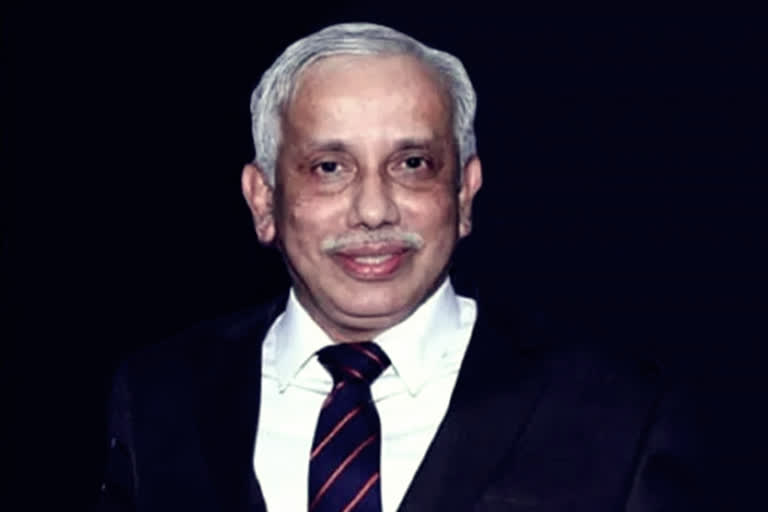New Delhi: Supreme Court judge, Justice S Abdul Nazeer, retired on Wednesday after serving a tenure of 6 years in the top court. Before this, he had served in the Karnataka High court. "When I look back at how it all began, it still feels like a dream come true," said Justice Nazeer in his farewell ceremony at New Delhi on Wednesday.
He said that he belonged to a small village, was the first one in his family to pursue litigation, enrolled in the bar and had tough initial years as he did not know English properly back then which was necessary in order to succeed. "I had also felt that I was not the smartest lawyer, wasn't the best in drafting
but I kept pushing and smiling," said Justice Nazeer.
"God has been very kind the way he planned my life, my journey was challenging, I had lived it all and I couldn't have asked almighty for anything more," he said. Speaking at his farewell, Chief Justice of India DY Chandrachud appreciated Justice Nazeer for his journey from a rural humble background to becoming the Supreme Court judge.
Justice has been part of several pathbreaking verdicts including those on the politically sensitive Ayodhya land dispute, instant 'triple talaq' and the one that declared 'right to privacy' a fundamental right.
Elevated as an apex court judge on February 17, 2017, Justice Nazeer was part of several Constitution benches which delivered judgments on issues ranging from demonetisation of currency notes of Rs 1,000 and Rs 500 denomination in 2016, to reservation for Marathas in admission and government jobs and the fundamental right of freedom of speech and expression of high public functionaries.
Born on January 5, 1958, he was enrolled as an advocate in February 1983 and later appointed as an additional judge of the Karnataka High Court on May 12, 2003. He was appointed as a permanent judge in September 2004. During his tenure as an apex court judge, Justice Nazeer was part of a five-judge Constitution bench which, by a majority of 4:1, dismissed the pleas seeking review of its 2018 verdict that had upheld the Centre's flagship Aadhaar scheme as constitutionally valid but struck down some of its provisions, including linking it with bank accounts, mobile phones and school admissions.
In another significant verdict by a five-judge Constitution bench which Justice Nazeer was part of, the apex court had held that a member of an SC/ST community from one state cannot claim the benefit of reservation in government jobs or admission in another state, if his or her caste is not notified there. He was part of a five-judge Constitution bench which had in November 2019 cleared the way for the construction of a Ram Temple at the disputed site at Ayodhya, and directed the Centre to allot a five-acre plot to the Sunni Waqf Board for building a mosque.
Before becoming a part of the Constitution bench in the Ayodhya case, Justice Nazeer was on a three-judge bench which by a majority of 2:1 declined to refer to a larger bench the issue of reconsideration of the observations in its 1994 judgement that a mosque was not integral to Islam. The issue had arisen during the hearing of the Ayodhya land dispute. In the 'triple talaq' case, a five-judge Constitution bench by a 3:2 majority had declared the practice of instant divorce among Muslims as "illegal" and "unconstitutional".
Justice Nazeer, along with then Chief Justice of India J S Khehar, was in minority in the 'triple talaq' judgement which was delivered in August 2017. Justice Nazeer-led five-judge Constitution benches delivered two separate verdicts this year including the one which by a majority of 4:1 validated the legality of the Centre's 2016 decision to demonetise the Rs 1,000 and Rs 500 denomination currency notes, saying the decision-making process was neither flawed nor hasty.
In another significant verdict by a 4:1 majority, Justice Nazeer-led bench ruled that additional restrictions cannot be imposed on the fundamental right of freedom of speech and expression of high public functionaries as exhaustive grounds already exist under the Constitution to curb that right.
In the August 2017 privacy verdict, the nine judges of a Constitution bench, including Justice Nazeer, were unanimous in declaring right to privacy as a fundamental right. In an important judgement in May 2021, a five-judge Constitution bench, which also comprised Justice Nazeer, refused to refer to a larger bench to revisit its 1992 Mandal verdict putting the cap on quotas at 50 per cent as it quashed a Maharashtra law granting reservations to Marathas in admissions and government jobs, saying it violated the principle of right to equality.



